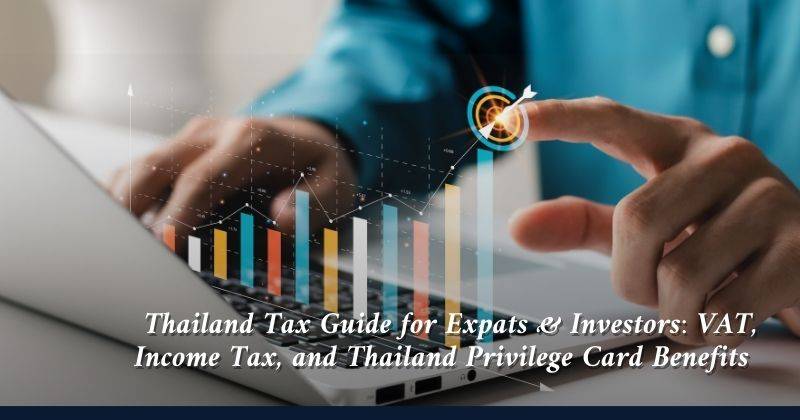
Thailand has a well-structured tax system that applies to both residents and non-residents, impacting expats, foreign investors, and tourists alike. Whether you’re living, working, or investing in Thailand, understanding Value-Added Tax (VAT), Personal Income Tax (PIT), and available tax benefits can help you stay compliant and optimize your tax obligations.
In this guide, we break down key aspects of Thailand’s tax system for foreigners, including how VAT works, income tax rules, and tax-saving opportunities such as the Thailand Privilege Card and LTR Visa.
1. Value-Added Tax (VAT) in Thailand
Value-Added Tax (VAT) is a consumption tax applied at each stage of production and distribution. In Thailand, the standard VAT rate is 7%, covering most goods and services, including dining, shopping, and entertainment. Businesses typically include VAT in the final price, so both locals and tourists pay this tax at the point of purchase.
Can Tourists Get a VAT Refund in Thailand?
Yes! If you’re visiting Thailand, you may be eligible for a VAT refund on purchases made at participating stores.
How to Claim a VAT Refund as a Tourist
To qualify for a VAT refund, tourists must meet these conditions:
Refunds can be processed at VAT refund counters in international airports or by submitting documents to the Thai Revenue Department.
2. Personal Income Tax for Foreigners in Thailand
Foreigners earning income in Thailand are subject to Personal Income Tax (PIT), with rates ranging from 5% to 35%, depending on income levels.
Who Needs to Pay Thai Income Tax?
Tax liability for foreigners is determined by two main rules:
📌 Thai Tax Source Rule – Any income earned from a Thai source is taxable, even if the person resides abroad.
📌 Thai Tax Residence Rule – Foreigners staying in Thailand for 180+ days per tax year are considered Thai tax residents and must pay income tax on worldwide earnings brought into Thailand.
Expats and investors can reduce their tax burden through:
Understanding Thailand’s tax system is crucial for expats, digital nomads, foreign investors, and retirees looking to manage their finances efficiently. Whether it’s VAT refunds for tourists, income tax for expats, or tax-saving opportunities through visas, staying informed ensures compliance and financial optimization.
For personalized tax advice, consult with a professional tax and immigration law firm to help you understand Thailand’s tax regulations and compliance while maximizing the benefits.
To schedule an appointment, call us at +662 670 1848 or email us at: btrelcat@harveylawgroupthailand.com.
——————————–
For the article’s sources:
These sources provide official tax regulations and residency program details.
Disclaimer: The content on this website is provided for general informational purposes and should not be interpreted as legal, financial, or professional advice. While we make every effort to ensure the information is accurate and current, some details may be subject to change or may not be fully up to date. We do not accept liability for any actions taken based on the information presented.

As part of the Thailand Grand Tourism and Sport Year 2025, Thailand Privilege has announced important updates for its members...
Read MoreThailand LTR has long been a captivating destination for global citizens, renowned for its vibrant culture, stunning landscapes, and thriving...
Read MoreDocument Checklist and Bank Options for Long-Term Resident Visa Holders
Read More
